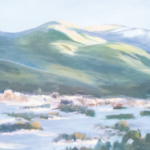I have enormous respect for real diagnosticians. I still remember the time when, as a medical student, I watched with amazement as an attending on what was then called the Chest Service precisely delineated the boundaries of a lung abscess by thumping with his fingers and hearing an E-to-O change with this stethoscope. “Wow,” I said to myself, “that’s slick,” although it was a long time ago, and I might have said neat, groovy, or cool instead.
Perhaps unique among specialists, rheumatologists value clinical skill and acumen and continue to aspire to serve patients just the way Hippocrates, Galen, or Osler did in bygone eras. Our spirit resides in the confines of a little black bag, squeezed next to a tuning fork, reflex hammer, or tape measure. I suspect, however, that the only little black bags anyone carries around anymore on the ward are made by Prada. Kate Spade could probably do a nifty job, but I do not think that the medical profession would be ready for a profusion of colors called coral, sophronitis, or sunshine.
Although our applicant pool was great, I nevertheless cannot help but worry about the direction of our specialty since, among the people who indicated an interest in research, not one said that he or she wanted to do basic science. Rather, … aspiring trainees professed an interest in translational research.
Bringing Science to the Applicant Pool
Although our applicant pool was great, I nevertheless cannot help but worry about the direction of our specialty since, among the people who indicated an interest in research, not one said that he or she wanted to do basic science. Rather, among those interested in academics, the aspiring trainees professed an interest in translational research. I think I know what basic or clinical research is, but the concept of translational research still eludes and puzzles me. I have yet to get a clear vision of the scope of translational research and how to train someone for this endeavor.
In the usual realm of commerce and politics, translators are middlemen and go-betweens. The root of the word actually means to carry over. The skill of translators is the mastery of two languages and the facility to render in real time—in the flick of an eye and the snap of a finger—the sense of words in one language into another in a bidirectional whir of word wizardry.
The training of a translator is therefore seemingly straightforward. If you want to be a French/English translator, you learn English if you speak French and French if you speak English. I doubt that simply having the knowledge of two languages is sufficient to be a good translator. The process must involve elaborate brain reprogramming, since words that go into the head in one language must come out in another with a fundamentally different vocabulary and syntax.

